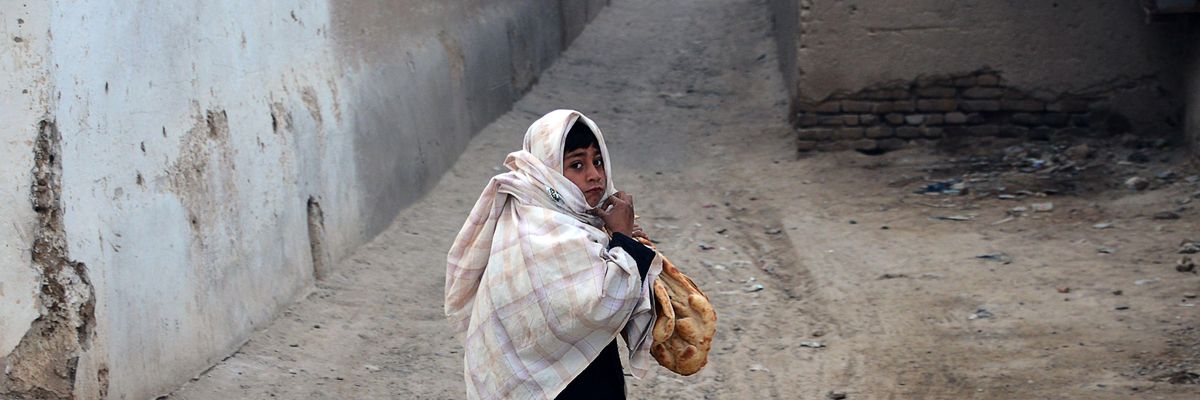Following the Biden administration's unilateral decision last week to seize $7 billion worth of assets from Afghanistan amid a mounting humanitarian crisis that threatens to kill more civilians than two decades of war, foreign leaders and critics worldwide continue to express disgust, with China on Tuesday condemning the U.S. for dispossessing Afghans of their own money.
"Without the consent of the Afghan people, the U.S. willfully disposes of assets that belong to the Afghan people, even keeping them as its own. This is no different from the conduct of bandits," Chinese Foreign Ministry spokesperson Wang Wenbin said Tuesday during a press conference in Beijing.
China's response came after U.S. President Joe Biden on Friday signed an executive order to confiscate more than $7 billion that the Afghan Central Bank has on deposit in the Federal Reserve. Biden froze those funds last August when the Taliban regained control of Kabul as U.S. military and NATO forces withdrew, and now he plans to divide them between the families of victims of the September 11, 2001 attacks and humanitarian aid for Afghanistan.
According to Wang, "This latest example has once again laid bare that the rules-based order the U.S. claims to champion is not the kind of rules and order to defend the weak and uphold justice, but to maintain its own hegemony."
He added that the U.S. "should unfreeze [Afghan] assets, lift unilateral sanctions on Afghanistan as soon as possible, and assume its due responsibility to ease the humanitarian crisis in the country."
Amid U.S. sanctions and worsening winter conditions, suffering in Afghanistan has reached catastrophic levels. According to the International Rescue Committee (IRC), 97% of Afghans are projected to fall into poverty by the second half of 2022. Moreover, nearly 23 million Afghans--over half of the country's population of roughly 40 million--are facing acute food insecurity, with one million children at risk of the most severe form of malnutrition.
If the Biden administration refuses to change course, more Afghans could starve to death in the coming months than were killed during two decades of U.S.-led war, prompting critics to describe the White House's decision to snatch the war-torn and poverty-stricken country's assets as "tantamount to mass murder" and reflective of a brutal willingness to facilitate "mass civilian death."
Related Content
'Death Sentence for Untold Numbers of Civilians': Biden to Permanently Seize Afghan Assets
Jon Queally
In a Tuesday interview with France24, former Afghan President Hamid Karzai urged Biden to reverse his decision to allocate $3.5 billion to families of victims of the 9/11 attacks, stressing that all $7 billion belongs to Afghanistan and that it is "wrong" for the U.S. to expropriate another country's money for its own purposes.
"The people of Afghanistan share the pain of the American people, share the pain of the families and loved ones of those who died, who lost their lives in the tragedy of September 11," Karzai said earlier this week.
"We commiserate with them [but] Afghan people are as much victims as those families who lost their lives. Withholding money or seizing money from the people of Afghanistan in their name is unjust and unfair and an atrocity against Afghan people," he added, asking U.S. courts to return the funds.
Phyllis Rodriguez, the mother of a victim of the 9/11 attacks, denounced Biden's "outrageous" move to take billions of dollars from Kabul to compensate Americans while millions of Afghans are on the brink of starvation due to economic sanctions the U.S. imposed at the conclusion of its 20-year war.
"The suffering of the Afghan people at the hands of the United States and its allies is reprehensible," she said. "This is adding insult to injury."
In an opinion piece published earlier this week, Bloomberg columnist Ruth Pollard wrote that in the wake of Biden's executive order, "many in Afghanistan and its diaspora pointed out the obvious:This appears to be a backwards attempt to punish Afghanistan for its role in the 2001 attacks on the U.S."
"If so," wrote Pollard, "the aim was off-target. Of the origins of the 9/11 hijackers, 15 came from Saudi Arabia, two from the United Arab Emirates and one each from Lebanon and Egypt. Not one was Afghan. The Taliban, who ruled most of the country, had provided refuge to Osama bin Laden; but, given the median age of Afghans today is 18, those attacks took place before many were even born."
As for the $3.5 billion that the White House has proposed using for humanitarian assistance in Afghanistan, peace activist Medea Benjamin, co-founder of CodePink, urged global aid groups to reject those funds and called on "other countries and institutions not to cooperate in the implementation of [Biden's] unjust order."
Experts have noted that the sovereign wealth captured by Biden undergirds Afghanistan's currency and is not meant for aid.
According to Pollard:
While the United Nations and other humanitarian groups work to convince the U.S. and the World Bank to ease what amounts to an economic blockade on Afghanistan, Biden's actions are blatantly counterproductive.
...U.N. chief Antonio Guterres in January called on the World Bank to immediately release $1.2 billion in reconstruction funds to ease the humanitarian crisis and inject liquidity to prevent an economic collapse. It had already transferred $280 million to the U.N. Children's Fund and the World Food Programme a month earlier.
As IRC president David Miliband told the U.S. Senate Foreign Relations Committee Subcommittee on Near East, South Asia, Central Asia, and Counterterrorism during a hearing last week, "The proximate cause of this starvation crisis is the international economic policy, which has been adopted since August and which has cut off financial flows not just to the public sector, but in the private sector in Afghanistan as well."
"Bank branches lack cash, and sanctions, which are meant to be on the Taliban, end up freezing private sector activity," said Miliband. "Aid cannot make up for an economy deprived of oxygen."
Graeme Smith of the International Crisis Group concurred, saying during the hearing that "you can send bags of food, but more than that, you need to address the reason why people are hungry, which is the collapse of the economy mostly due to Western economic restrictions."
Mark Weisbrot, co-director of the Center for Economic and Policy Research and long-time critic of sanctions, said this week in a statement that "a country without central bank reserves is on a road to economic collapse. By confiscating these reserves, the U.S. government is guaranteeing this collapse, and the resulting widespread death and mass migration."
"This is fatally wrong and immoral, and it cannot continue," said Weisbrot. "The only question is how many people will die before the U.S. government changes its policy."




